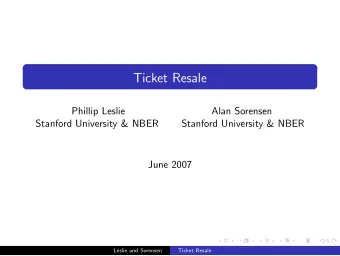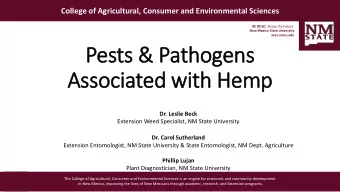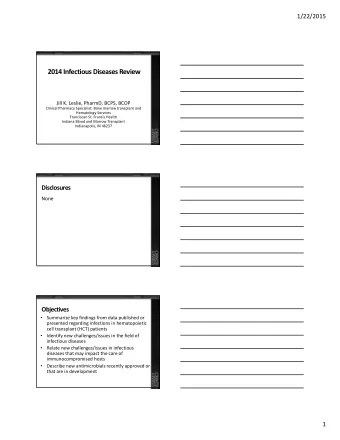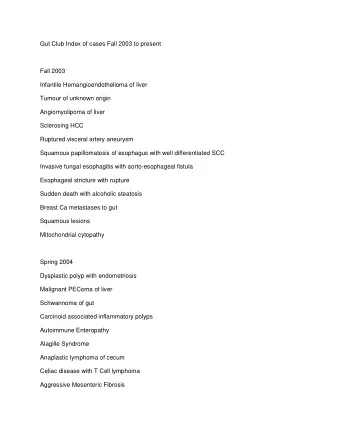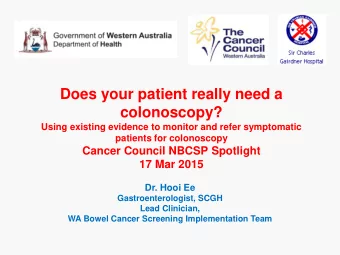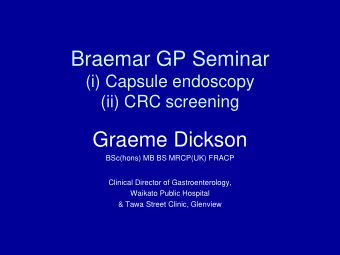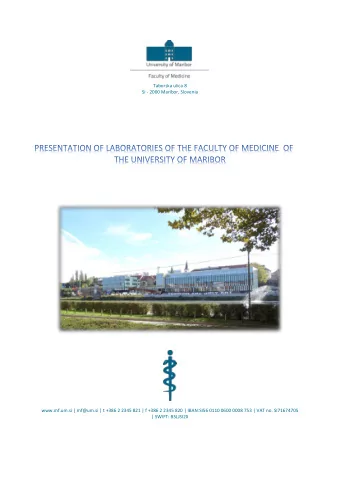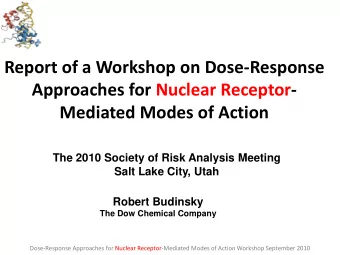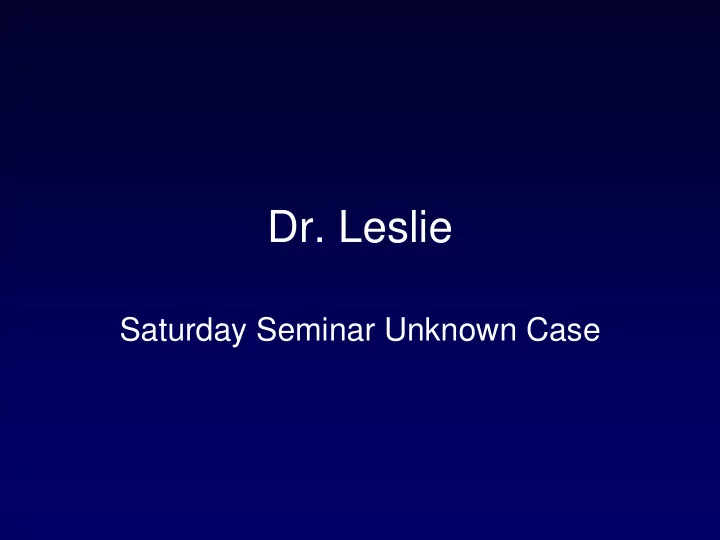
Dr. Leslie Saturday Seminar Unknown Case Case History A 47 year - PowerPoint PPT Presentation
Dr. Leslie Saturday Seminar Unknown Case Case History A 47 year old woman is found to have several lung nodules in the right lower lobe. Three (3) were excised, all with similar histopathology. Questions to consider: Is this a neoplasm? If a
Dr. Leslie Saturday Seminar Unknown Case
Case History A 47 year old woman is found to have several lung nodules in the right lower lobe. Three (3) were excised, all with similar histopathology. Questions to consider: Is this a neoplasm? If a neoplasm is it benign or malignant? Is there any other information regarding the patient that would help you resolve 1 or 2 above? What, if any, immunohistochemical stains might you perform in resolving a definitive diagnosis?
Case History The patient has Cowden Syndrome…
Surgery • On excision the lesion was well circumscribed but did not seem to have a defined capsule • On sectioning, the lesion was tan with areas of cystic degeneraton • Representative sections were taken
PanCK TTF-1 TTF-1 PanCK
Differential diagnosis • Alveolar adenoma • Carcinoid tumour • Carcinoma, primary or metastatic • Papillary adenoma of Type 2 cells • Pneumocytoma • Salivary gland tumor
DIAGNOSIS Pneumocytoma (Pulmonary sclerosing hemangioma)
Pneumocytoma • A well-circumscribed but un- encapsulated lesion • The diagnosis is made through the recognition of a multitude of growth patterns
Pneumocytoma Four growth patterns are identified consistently: 1) Papillary 2) Sclerotic 3) Solid 4) Hemorrhagic
Pneumocytoma • Two cell types occur in all lesions: • One is a cuboidal cells that lines the papillary structures and blood-filled cysts
Pneumocytoma • The other is bland polygonal/round cell with abundant pale cytoplasm with growth in solid sheets (always look in the solid areas)
Pneumocytoma • Calcifications and ossification can occur along with peculiar giant lamellar bodies
Immunohistochemistry • Both the surface cells and pale round stromal cells are positive for TTF-1 and express selected epithelial markers (EMA, surfactant apo-protein B) • Cytokeratin is positive only in the surface cells (negative in the round stromal cells)
Immunohistochemistry • Pneumocytoma is the only adult neoplasm that expresses TTF-1 in the absence of pan- cytokeratin.
Histogenesis On the basis of the immuno- histochemistry analysis it is believed that the cells arise from primitive type 2 pneumocytes
Prognosis • Sclerosing hemangioma is considered a benign lesion despite a few rare cases that have been reported with regional lymph node metastases • The presence of the lymph node metastases did not affect prognosis
COWDEN SYNDROME • A “PTEN-opathy” resulting from inherited dysfunction of PTEN (Phosphatase and TENsin homolog deleted on chromosome TEN) • “PTEN hamartoma tumor syndrome” (PHTS) can be used to describe any patient with germline PTEN mutation regardless of phenotype.
A R T I C L E When Overgrowth Bumps Into Cancer: The PTEN-opathies JESSICA MESTER AND CHARIS ENG American Journal of Medical Genetics Part C (Seminars in Medical Genetics) 163C:114–121 (2013)
References • 1. Bardenstein DS, McLean IW, Nerney J, Boatwright RS. Cowden's disease. Ophthalmology. 1988; 95 (8): p. 1038-1041. • 2. Dacic S, Sasatomi E, Swalsky PA, et al. Loss of heterozygosity patterns of sclerosing hemangioma of the lung and bronchioloalveolar carcinoma indicate a similar molecular pathogenesis. Arch Pathol Lab Med. 2004; 128 (8): p. 880-884. • 3. Kalhor N, Staerkel GA, Moran CA. So-called sclerosing hemangioma of lung: current concept. Ann Diagn Pathol. 2010; 14 (1): p. 60-67. • 4. Keylock JB, Galvin JR, Franks TJ. Sclerosing hemangioma of the lung. Arch Pathol Lab Med. 2009; 133 (5): p. 820-825. • 5. Liebow AAHubbell DS. Sclerosing hemangioma (histiocytoma, xanthoma) of the lung. Cancer. 1956; 9 (1): p. 53-75. • 6. Lloyd KM, 2ndDennis M. Cowden's disease. A possible new symptom complex with multiple system involvement. Ann Intern Med. 1963; 58 : p. 136-142. • 7. Shimosato Y. Lung tumors of uncertain histogenesis. Semin Diagn Pathol. 1995; 12 (2): p. 185-192.
Questions
Recommend
More recommend
Explore More Topics
Stay informed with curated content and fresh updates.





